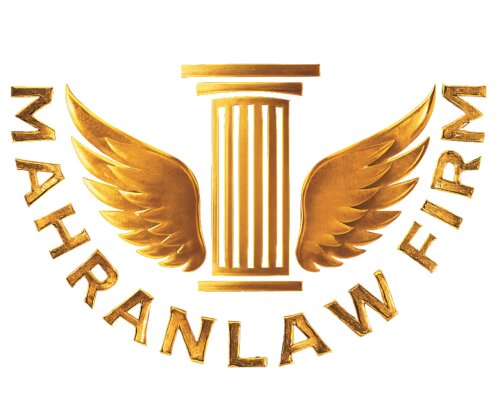Best Wage & Hour Lawyers in Agouza
Share your needs with us, get contacted by law firms.
Free. Takes 2 min.
List of the best lawyers in Agouza, Egypt
About Wage & Hour Law in Agouza, Egypt
This guide provides a clear, practical overview of wage and hour issues for employees and employers in Agouza - a district within Giza governorate in Greater Cairo. Wage and hour disputes in Egypt are governed by national labor law and implemented locally through the Ministry of Manpower and Immigration and its labor inspection offices. Local labor offices in Giza and Agouza handle initial conciliations and inspections, while specialised labor courts hear unresolved disputes. This guide explains the legal framework, common situations that require legal help, what to expect from local procedures, frequently asked questions, useful resources, and recommended next steps.
Why You May Need a Lawyer
Many wage and hour matters benefit from legal advice because they involve specific rights, deadlines, and formal procedures. You may need a lawyer if you face:
- Unpaid wages or partial payment for work performed.
- Dispute over overtime pay, shift differentials, or weekend and holiday compensation.
- Wrongful dismissal or disputes over notice, severance, and end-of-service pay.
- Discrepancies in pay slips, unlawful deductions, or missing social-insurance contributions.
- Problems with workplace hours, forced overtime, or violations affecting safety and health.
- Employer retaliation, harassment, or cases involving withholding of identity documents or passports.
- Complex cases involving foreign workers, multiple employers, or cross-border elements.
Lawyers help by assessing your claim, advising on likely outcomes, preparing and filing complaints, representing you in conciliation meetings and court, and protecting your rights during negotiations or litigation.
Local Laws Overview
Key aspects of Egyptian wage and hour law that are especially relevant in Agouza include:
- Legal framework - National labor law governs working hours, wages, overtime, leave, termination, and employee protections. Local labor offices and labour courts enforce these rules within Giza governorate, including Agouza.
- Working hours - The law defines normal working time and authorises overtime under specified conditions. Employers must respect limits on daily and weekly working time and provide compensation for overtime as required by law or contract.
- Wages and pay slips - Employers must pay agreed wages and provide pay slips that show gross pay, deductions, and net pay. Unlawful deductions are prohibited and can be challenged.
- Overtime and premium pay - Overtime work generally requires higher pay. Premiums for night work, weekend work, and public holidays may apply under law or collective agreements.
- Leave and benefits - Employees are entitled to annual paid leave, sick leave, maternity leave, and public-holiday entitlements under statutory rules and insurance conditions.
- Termination and indemnities - Termination rules require proper notice or pay in lieu, and in many cases end-of-service indemnities or severance payments are due. Some dismissals may be unlawful or arbitrary and subject to remedy.
- Social insurance and contributions - Employers must make social-insurance contributions and register employees where applicable. Missing contributions affect access to benefits and can be a separate enforcement issue.
- Enforcement and dispute resolution - Most wage-and-hour disputes begin with a complaint to the local labour office or labour inspection for conciliation. If conciliation fails, matters proceed to the labour courts. The Ministry of Manpower and Immigration and labour inspectors can also carry out workplace inspections and impose penalties.
Frequently Asked Questions
What are the normal working hours, and am I entitled to overtime pay?
Normal working hours are set by law and by contract or collective agreement. Employers may require overtime within legal limits but must compensate it at a higher rate or according to the contract. If you think you are being required to work excessive hours or are not paid for overtime, keep records of hours worked and seek advice from the local labour office or a lawyer.
How do I check that my employer is paying the correct wages and contributions?
You should receive pay slips showing wages and any deductions. Keep copies of contracts, pay slips, bank statements, and time records. If social-insurance contributions are missing or incorrect, you can raise the issue with the employer, the local social-insurance office, or a lawyer. Labour inspectors can investigate employers for noncompliance.
What should I do if my employer has not paid my wages or final pay?
First, gather evidence - employment contract, pay slips, records of hours, written requests for payment, and any communications. Try an internal request in writing. If payment is not made, file a complaint with the local labour office for conciliation. If conciliation fails, a lawyer can help file a claim before the competent labour court for recovery of unpaid wages and related remedies.
How soon must I act if I have a wage or hour dispute?
There are time limits for labour claims, and some remedies have relatively short deadlines. You should act promptly. Even if you are unsure, contact the labour office or a lawyer as soon as possible to preserve evidence and learn the applicable filing deadlines.
Am I entitled to paid annual leave, sick leave, or maternity leave?
Employees are generally entitled to statutory paid annual leave after a qualifying period of service, and to sick and maternity leave under the law and social-insurance rules. Eligibility and benefit levels may depend on your contract, length of service, and insurance status. Confirm your entitlements and any required medical or administrative documentation.
What are my rights if I was dismissed - do I have a right to severance or notice?
Termination rights depend on whether dismissal was lawful, the type of contract, and length of service. In many cases employers must give notice or pay in lieu of notice and may owe severance or end-of-service indemnity. Wrongful or arbitrary dismissals can be contested through conciliation and labour courts. Consult a lawyer to evaluate the dismissal and potential remedies.
Can I file a complaint if my employer makes unlawful deductions from my wages?
Yes. Unlawful deductions are contestable. Keep pay slips and evidence of the deductions, request a written explanation from the employer, and if unresolved file a complaint with the labour office. Labour inspectors and courts can order repayment of unlawful deductions.
Are there special rules for domestic workers, temporary workers, or foreign workers?
Different categories of workers may have particular rules and protections. Domestic workers and short-term or informal workers may face challenges enforcing rights; foreign workers must also comply with work-permit and immigration rules. If you belong to one of these groups, seek advice early - many legal options and procedural requirements differ by status.
What should I bring to a meeting with a labour inspector or lawyer?
Bring your employment contract, pay slips, time and attendance records, any written communications with the employer about pay or hours, identification, social-insurance documents, and bank statements showing payments received. A clear timeline of events and copies of supporting documents will strengthen your case.
Can I join a union or participate in collective bargaining?
Trade unions and collective bargaining exist under Egyptian labour law. Joining a lawful union is a route to collective remedies and workplace bargaining. There are rules about union formation and collective action; involving a union representative or lawyer can help you understand your options and the procedures for collective disputes or strikes.
Additional Resources
These local and national institutions can provide information or assistance:
- Ministry of Manpower and Immigration - labour inspection and conciliation services.
- Local labour office or labour inspection branch in Giza governorate - initial complaint and inspection services for Agouza residents.
- Labour courts that handle employment disputes at the governorate level.
- National Social Insurance Organization - inquiries about contributions and social-security benefits.
- Egyptian Bar Association and local bar associations - lists of licensed labour lawyers and legal aid services.
- Trade unions and workers associations relevant to your sector.
- International Labour Organization regional or country office - for international standards and guidance.
- Local legal aid clinics and NGOs that provide worker-support services or advice.
Next Steps
If you believe your wage or hour rights in Agouza have been violated, follow these steps:
- Document everything - collect contracts, pay slips, time records, messages, bank statements, and a written timeline.
- Try an internal resolution - put a written request to the employer asking for clarification or payment. Keep proof of delivery.
- Contact the local labour office or labour inspection in Giza for information on conciliation procedures and to file a formal complaint if necessary.
- Consult a qualified labour lawyer - a lawyer can advise on the strength of your claim, help meet filing deadlines, and represent you in conciliation or court.
- Preserve evidence and witnesses - make copies of all documents, record witness names and contact information, and secure any physical evidence.
- Be mindful of deadlines - labour claims often have statutory time limits. Acting quickly preserves your legal options.
- Consider alternative dispute resolution - conciliation or mediation through the labour office may offer a faster practical outcome than litigation.
Getting professional advice early will increase the chances of a successful outcome. If you need assistance finding a local labour lawyer or preparing documents, start with the local labour office or the Giza bar association for referrals and next-step guidance.
Lawzana helps you find the best lawyers and law firms in Agouza through a curated and pre-screened list of qualified legal professionals. Our platform offers rankings and detailed profiles of attorneys and law firms, allowing you to compare based on practice areas, including Wage & Hour, experience, and client feedback.
Each profile includes a description of the firm's areas of practice, client reviews, team members and partners, year of establishment, spoken languages, office locations, contact information, social media presence, and any published articles or resources. Most firms on our platform speak English and are experienced in both local and international legal matters.
Get a quote from top-rated law firms in Agouza, Egypt — quickly, securely, and without unnecessary hassle.
Disclaimer:
The information provided on this page is for general informational purposes only and does not constitute legal advice. While we strive to ensure the accuracy and relevance of the content, legal information may change over time, and interpretations of the law can vary. You should always consult with a qualified legal professional for advice specific to your situation.
We disclaim all liability for actions taken or not taken based on the content of this page. If you believe any information is incorrect or outdated, please contact us, and we will review and update it where appropriate.









